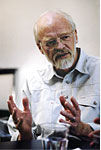A Question Worth Asking
 Writers spend a lot of time working with words, listening to words and reading words. This past week, I found a 26–page speech/ article from Dr. Eugene H. Peterson called What Are Writers Good For? I recommend the entire document which Dr. Peterson presented as a part of the International Christian Retail Show last summer in Denver, Colorado at the Tattered Cover Book Store. Alive Communications, a literary agency, hosted the event with authors and industry executives. As the Alive Communications website mentions, Dr. Peterson rarely speaks. Several years ago as an editor, I worked with Dr. Peterson to get a foreword for an amazing book from Harold Fickett called
Writers spend a lot of time working with words, listening to words and reading words. This past week, I found a 26–page speech/ article from Dr. Eugene H. Peterson called What Are Writers Good For? I recommend the entire document which Dr. Peterson presented as a part of the International Christian Retail Show last summer in Denver, Colorado at the Tattered Cover Book Store. Alive Communications, a literary agency, hosted the event with authors and industry executives. As the Alive Communications website mentions, Dr. Peterson rarely speaks. Several years ago as an editor, I worked with Dr. Peterson to get a foreword for an amazing book from Harold Fickett called Dancing With the Divine. At that time, Dr. Peterson didn’t use email and all of our communications used the regular postal mail or the telephone. I have a great appreciation for Dr. Peterson and his work on The Message Bible.
This entire speech is excellent and worth your reading attention. In particular, I want to emphasize a couple of paragraphs:
“And that is what writers are good for, to use metaphor and story and poem to bring our friends and neighbors into participation in the Great Conversation where creation and revelation and salvation take place. Apart from writers, most language between Sundays is used for information, for publicity, for motivation, for entertainment, and diversion, preparing for and passing exams, for selling cars and buying lingerie. These are all useful and legitimate uses of language for getting on with one another and in the world. But there is nothing creative or saving in such language.
“And we have our work cut out for us. For most of the language that we learn in school and neighborhood, on radio and television is not revelational, is not creative, is not sanctifying, is not personal.”
Do we consider our use of language and treat all words as sacred because of the power of communication? It’s a question worth considering as we write many different types of communication. It’s better to ask the question and have some sense of an answer (even if it is an answer-in-progress) instead of trooping through life without thinking about it.





















2 Comment:
“…We do it by writing stories and poems and songs, by writing proverbs and aphorisms, by giving witness. We do it by treating all words as sacred, capable of bringing readers or listeners into a participating relationship with our children, with cloud formations, with disasters and celebrations, with friends and neighbors, with Father, Son and Holy Spirit.”
It’s nice to have validation from someone of such renown, to one of the most persistent nags a Christian writer often faces: “should I really be spending so much time making up stories (or any of those things mentioned above) instead of simply sharing the Four Spiritual Laws or doing more hands-on outreach work?” Dr. Peterson does a wonderful job of linking ordinary things with spiritual, which reflects more of the balance that many of us are craving these days and wondering why.
Perhaps the fact that so many of the lost do not travel in religious circles, puts a more vital importance on what writers do. Which would better explain the tremendous battles between “light and dark” that are going on in the publishing world today (especially in the children’s market), revealing that our words might very well be more important in the great scheme of things than any of us fully realize.
If that’s true, then “Finally brethren, whatsoever things are true, whatsoever things are honest, whatsoever things are just, whatsoever things are pure, whatsoever things are lovely, whatsoever things are of good report; if there be any virtue, and if there be any praise, think on these things.” (Philippians 4:8) begins to take on a whole new meaning.
Thanks for sharing this, Terry. It was a blessing!
Fantastic content, thanks for publishing Peterson's thoughts on this (lingering) question.
Post a Comment
That's the writing life...
Back to the home page...